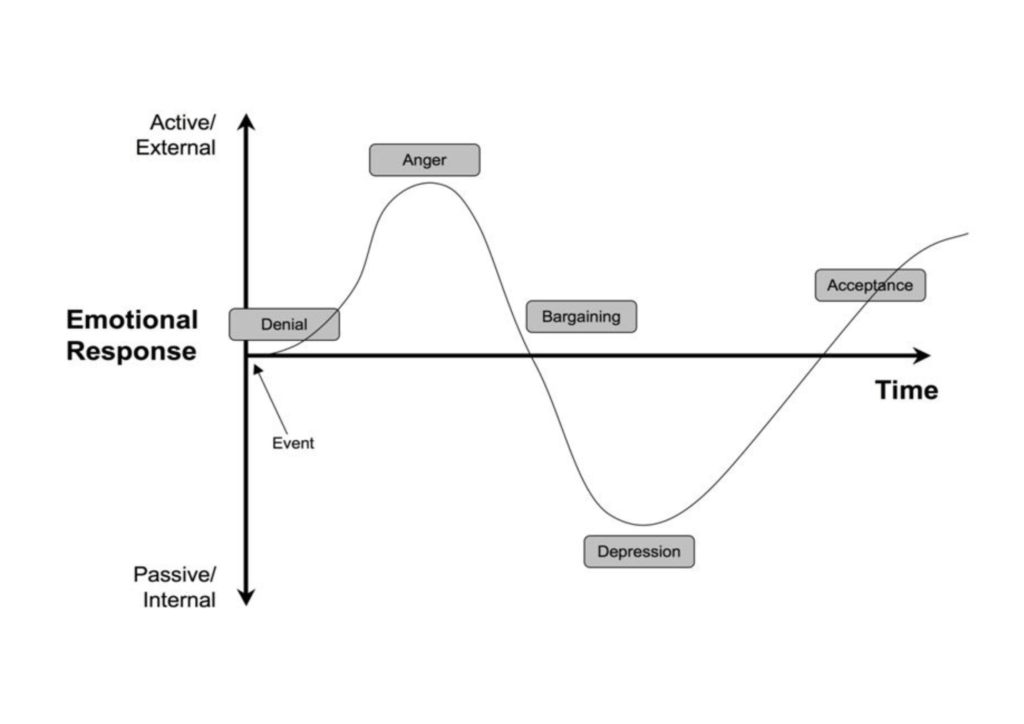A Guide to Managing Grief

Grief is an intricate and deeply personal journey that you embark on after experiencing the profound loss of a loved one. Whether it’s the death of a family member, a friend, or a beloved pet, grief manifests in various forms and can be an overwhelming and disorienting experience. In this blog post, we will explore the multifaceted nature of grief and offer insights into managing it in a healthy and constructive manner.
Understanding Grief:
Grief is not a linear process; it’s a rollercoaster of emotions that ebbs and flows over time. Elisabeth Kübler-Ross famously identified five stages of grief: denial, anger, bargaining, depression, and acceptance. Denial often serves as a psychological defence mechanism, providing a temporary buffer against the overwhelming reality of loss. As individuals gradually move through anger, bargaining, and depression, acceptance emerges as a potential pathway towards healing. However, acceptance does not imply forgetting or complete resolution; instead, it signifies a capacity to integrate the loss into one’s life.

It is important to note that these stages are not a strict roadmap, and you may experience them in different orders or revisit certain stages. Your grief journey is unique, influenced by factors such as your relationship with the deceased, the circumstances of the death, and your own coping mechanisms.
Acknowledging Grief:
Grief can exert a profound impact on mental well-being, influencing cognitive, emotional, and behavioural aspects of an individual’s life. The first step in managing grief is acknowledging it. Society sometimes pressures individuals to “move on” or “get over it” quickly, but grief doesn’t adhere to a schedule. It’s crucial to allow yourself the time and space to grieve, recognising that healing is a gradual process. Suppressing emotions or pretending everything is fine can lead to more significant challenges in the long run.
Expressing Grief:
People express grief in diverse ways, and finding healthy outlets for these emotions is key. You may find solace in talking about your loved ones, sharing memories, or creating rituals to honour their memory. You might prefer private expressions, such as journaling or engaging in activities that provide comfort. There is no right or wrong way to grieve, and you should embrace what feels authentic to you.
Coping Strategies:
Various coping strategies can help you manage grief more effectively. Engaging in regular exercise, maintaining a balanced diet, and ensuring adequate sleep contribute to overall well-being during challenging times. Additionally, mindfulness practices, such as meditation and yoga, can provide a sense of calm and help you stay grounded amidst the emotional whirlwind of grief.
Maladaptive coping mechanisms, such as avoidance or substance abuse however, can impede the healing process. Understanding the balance between confronting and managing emotions, rather than suppressing them, is crucial for psychological well-being. Professional psychological support, such as grief counselling or therapy, can provide individuals with tools to navigate these challenges effectively.
Memorialising the Deceased and Navigating Triggers:
Creating meaningful tributes or memorials can be a powerful way to honour and remember the person who has passed away. This could involve establishing a memorial fund, planting a tree, or participating in activities that held significance for the deceased. Memorialising the person’s impact on your life can contribute to a sense of closure and keep their memory alive in a positive and affirming way.
Certain dates, anniversaries, or specific triggers may intensify feelings of grief. It’s important to anticipate these moments and plan self-care strategies accordingly. Surrounding yourself with supportive individuals, engaging in comforting activities, or even commemorating the occasion in a special way can help you navigate these challenging times with more resilience.
Seeking Support
Grieving can be an isolating experience, but it’s important to remember that support is available. Friends, family, and support groups can offer a sense of connection and understanding. Professional help, such as counselling or therapy, can provide a safe space to explore and navigate complex emotions. Sometimes, sharing the burden of grief with others can lighten the load and facilitate healing.

Grief is a universal human experience, but the journey is intensely personal. Managing grief after bereavement or loss involves recognising and accepting the emotions that arise, seeking support, and finding healthy ways to cope. There is no timeline for healing, and you should honour your unique process, allowing time for self-compassion and growth.
To learn more about managing grief after bereavement or loss, reach out to us via info@nnpsychology.co.uk or call us on 07341193858
Remember, by acknowledging grief, expressing emotions, seeking support, and embracing constructive coping strategies, you can navigate the waves of grief with resilience and move towards a place of healing and acceptance.
Further Reading:


